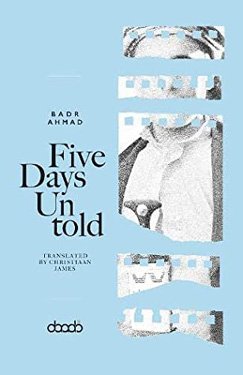Several years ago I acted as an extra in a docudrama about a conflict in Afghanistan where I played a soldier. I was given a crash course in military training and how to handle a real weapon which was only armed with blanks. When filming started I fumbled with my weapon and found it difficult to keep pace with the other actors as they raced across the set re-enacting a war. The arms expert, crew and other actors got quite annoyed at what an incompetent soldier I made and it's safe to say my performance wasn't convincing. Luckily this was just a fictional situation and I've not ever been conscripted or made to perform compulsory military service. Ziad Al-Niqash, a young man who is one of the central characters of “Five Days Untold”, isn't so fortunate as an order delivered to his home commands him to join in the civil war occurring in his country. Though the specific location and conflict isn't named in the text, one can assume this is set during the civil war in Yemen given the author Badr Ahmad's nationality and because it takes place over the New Year of 2017-2018. We follow his harrowing journey being drawn into military service, the experiences of his family and the malicious plot of a local tyrant named Naji Awad. It's a terrifying insight into what it means to be a frightened young man who is suddenly forced to be a solider.
There's a lot of pressure on Ziad at home already since he is the only son of his family and his father is mentally and physically unwell. Equally, he's made to feel like he must work in a specific job to support his family although his heart is drawn to a different kind of profession. So it's all the more heartbreaking when he's suddenly forced to become a soldier and he frantically wonders “how will I avoid being killed? I was unable to process it all. I wasn't made for this. I was created to draw and sculpt, to cultivate beauty in small corners, and to plant delight in people's souls.” The narrative follows the five days of his service which feels to him more like a lifetime as he's immediately fearful for his life and he encounters numerous gruelling attacks. The way this is vividly presented is so moving and heart racing. It's powerful how the author portrays the psychologically and physically destructive effects of such an experience while Ziad desperately clings to his humanity. At the same time, it's so brutal how little he's valued as an individual by many of the soldiers around him and how he's viewed as an absolute enemy by the opposing forces though he clearly didn't want to enlist in the first place. It's a devastating and impossible position to be in.
Though I appreciated how the author tried to also portray a politically-powerful man who is involved in dodgy arms dealing, I didn't think the characterization of Naji Awad was as convincing and his storyline seemed to belong more to a generic thriller. I don't doubt such self-interested and vicious people exist, but the way the author depicted his motivations for being such from his bad childhood to his impotence resulting from a car crash injury was rather rushed. It also made me very uncomfortable how the extreme sexual violence inflicted upon his wife was dealt with in an equally hasty manner. There's a scene where she seems on the brink of exacting her revenge which felt quite confusing and his story plays out in a rickety over-dramatised way. For instance, there's a scene where he enters a dance studio and takes out a gun but eventually leaves without anyone there seeming to notice him. Though the tensions amongst Ziad's family were handled somewhat better, I felt their unique story got swallowed up in a clunky plot and lacked the atmosphere present in the young man's sections.
I greatly appreciated reading a story from Yemen that concerns a conflict I've never read about in fiction before. However, I wish the novel had focused solely on Ziad's point of view as this was undoubtably the heart of the book. I'm still grateful to have read this because the way it immerses you in the perspective of a young soldier is very impactful. It’s wonderful seeing more Arabic fiction being translated into English from the publisher Dar Arab.








